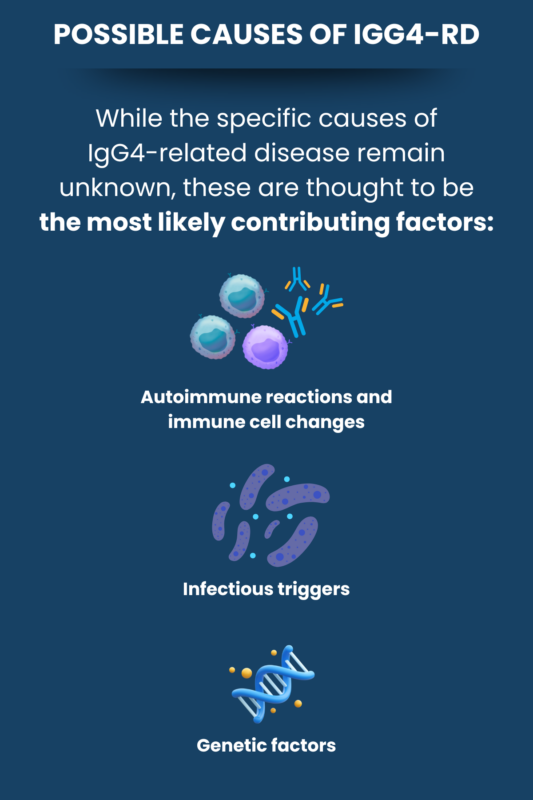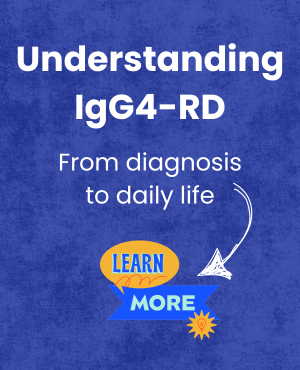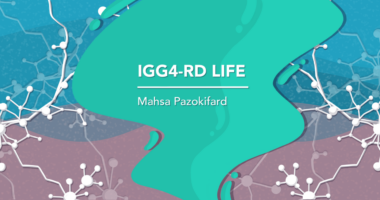
IgG4-related disease causes
Last updated May 15, 2025, by Lindsey Shapiro, PhD

Researchers haven’t pinpointed exactly what causes immunoglobulin G4-related disease (IgG4-RD), an immune-mediated condition characterized by inflammation and scarring (fibrosis) that cause tumor-like masses or swelling in various tissues and organs.
There are a number of possible contributing factors for the aberrant immune activity that marks the disease, including autoimmune reactions, infections, and genetics. Risk factors like age, sex, environmental factors, and other health conditions could also contribute.
But more research is still needed to uncover the exact causes of IgG4-RD, which will help doctors better diagnose and treat it in the future.
Understanding the causes of IgG4-RD
In IgG4-RD, immune cells including lymphocytes (T-cells and B-cells) and plasma cells, an activated form of B-cells that produce large amounts of antibodies, densely infiltrate the body’s tissues, driving inflammation and fibrosis. Found in particularly high numbers are plasma cells that secrete IgG4 antibodies, which normally have anti-inflammatory and immune-regulating roles.
The inflammation and fibrosis that mark IgG4-RD cause tissues to thicken and harden, leading to the characteristic tumor-like masses and swelling that contribute to IgG4-RD symptoms.
While it is clear that immune dysregulation is central to IgG4-RD, scientists don’t currently know exactly what causes it. However, current evidence points to autoimmune responses, infectious triggers, and genetic factors as potential contributors.
Autoimmune response
The immune system generates antibodies to help it attack potentially harmful invaders like bacteria and viruses. But in autoimmune diseases, this process is dysregulated and the immune system wrongly produces self-reactive antibodies that attack the body’s own healthy tissues.
A leading theory about IgG4-RD development is that autoimmune responses driven by self-reactive B-cells and T-cells may cause IgG4-RD, but the exact mechanisms through which this might happen have not been completely established.
Studies have identified self-reactive antibodies in people with IgG4-RD — including those against the trypsinogen, galectin-3, laminin-511, and prohibitin proteins — supporting a possible autoimmune basis. However, no single protein has been definitively established as the universal target of misdirected immune attacks in the disease, so more research is needed.
Infectious triggers
Some researchers believe that certain infectious agents, such as the bacteria Helicobacter pylori or Mycobacterium tuberculosis, could influence the immune system in ways that trigger IgG4-RD.
A hypothesis behind this idea is based on molecular mimicry, where a protein in a microbe is structurally similar to a protein naturally made in the human body, causing microbe-fighting antibodies to also attack the body’s protein.
For example, some research has suggested that in IgG4-RD, the immune system accidentally attacks proteins found in the pancreas because they look similar to ones in H. pylori, leading to a common IgG4-RD presentation called autoimmune pancreatitis.
However, in general, there isn’t concrete evidence linking past infections to IgG4-RD development.
Genetic factors
IgG4-RD is not considered a hereditary disease, meaning it isn’t passed down directly from parent to child in a predictable way. However, it’s possible that inheritance of certain genetic factors could increase a person’s susceptibility to developing the condition, potentially interacting with environmental factors such as infections to trigger its development.
For example, variants in the HLA genes, which are involved in immune function and implicated in a variety of autoimmune conditions, have been reported to potentially increase the risk of IgG4-RD marked by autoimmune pancreatitis. Variants in other genes involved in immune responses have also been described as potential IgG4-RD risk genes, and some have been associated with specific disease manifestations.
Moreover, some data suggest that having a family history of other autoimmune conditions may be a risk factor for developing IgG4-RD, lending further support to the idea that genetics could be involved.
Still, further research is needed to know more about the role of genetics in driving IgG4-RD.

IgG4-RD risk factors
While anyone can develop IgG4-RD, certain demographic, environmental, and health-related characteristics have been associated with an increased risk. Still, having one or more of these IgG4-RD risk factors does not mean a person will absolutely develop the condition, and research is still ongoing to establish their exact relationship with the disease.
Possible risk factors for IgG4-RD include:
- age, as it tends to affect people older than 50
- male sex
- certain genetic variants
- tobacco exposure, particularly linked to a common IgG4-RD manifestation called retroperitoneal fibrosis
- environmental and occupational exposures to asbestos, dusts and chemical solvents, or other pollution components, mostly associated with specific disease manifestations
- other health conditions, such as autoimmune diseases.
These factors may also affect exactly how the disease presents itself. For example, while men are at a higher risk of IgG4-RD overall, IgG4-RD that’s limited to the head and neck has been reported more commonly in women and people of Asian descent.
Unresolved questions and ongoing research
Ongoing research is focused on better understanding the possible IgG4-RD causes. Current areas of investigation aim to better understand:
- the distinct roles of T-cells and B-cells in driving the disease
- specific triggers, such as body molecules or infectious agents
- associations between self-reactive antibodies and specific disease manifestations
- genetic risk factors.
A key question that remains is how IgG4 antibodies, which normally have anti-inflammatory and immune-regulating effects, come to be associated with a disease marked by inflammation and fibrosis. It’s possible that these antibodies are not the drivers of tissue damage, but are instead the immune system’s attempt to control the excessive inflammation that’s occurring for other reasons.
A better understanding of these processes may lead to innovations in IgG4-RD diagnosis and IgG4-RD treatment.
IgG4-RD News is strictly a news and information website about the disease. It does not provide medical advice, diagnosis, or treatment. This content is not intended to be a substitute for professional medical advice, diagnosis, or treatment. Always seek the advice of your physician or other qualified health provider with any questions you may have regarding a medical condition. Never disregard professional medical advice or delay in seeking it because of something you have read on this website.
Recent Posts
- Neurological symptoms may be more common in IgG4-related disease
- Guest Voice: Living with IgG4-RD is the new hobby I didn’t want
- In the language of illness, words can heal, or they can hurt
- IgG4-RD patients with allergy history are more likely to relapse: Study
- Eye muscle involvement may raise relapse risk in IgG4-related eye disease



